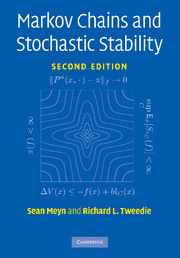Preface to the first edition
Published online by Cambridge University Press: 05 August 2012
Summary
Books are individual and idiosyncratic. In trying to understand what makes a good book, there is a limited amount that one can learn from other books; but at least one can read their prefaces, in hope of help.
Our own research shows that authors use prefaces for many different reasons. Prefaces can be explanations of the role and the contents of the book, as in Chung [71] or Revuz [326] or Nummelin [303]; this can be combined with what is almost an apology for bothering the reader, as in Billingsley [37] or Çinlar [59]; prefaces can describe the mathematics, as in Orey [309], or the importance of the applications, as in Tong [388] or Asmussen [9], or the way in which the book works as a text, as in Brockwell and Davis [51] or Revuz [326]; they can be the only available outlet for thanking those who made the task of writing possible, as in almost all of the above (although we particularly like the familial gratitude of Resnick [325] and the dedication of Simmons [355]); they can combine all these roles, and many more.
This preface is no different. Let us begin with those we hope will use the book.
Who wants this stuff anyway?
This book is about Markov chains on general state spaces: sequences ψn evolving randomly in time which remember their past trajectory only through its most recent value. We develop their theoretical structure and we describe their application.
- Type
- Chapter
- Information
- Markov Chains and Stochastic Stability , pp. xxi - xxviiiPublisher: Cambridge University PressPrint publication year: 2009



